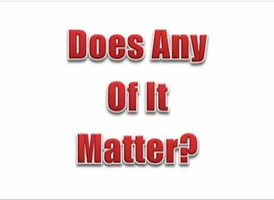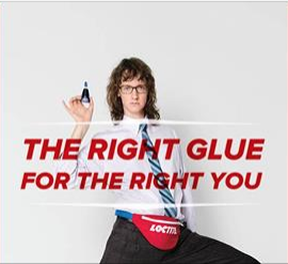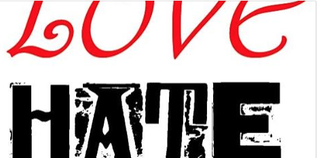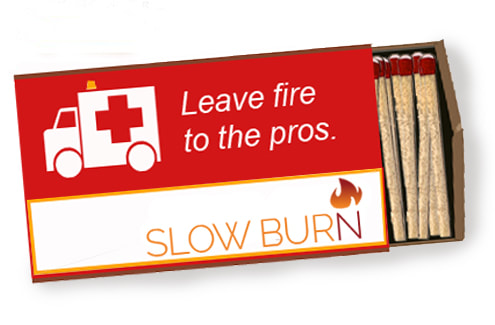 Last time, we touched on the mutually inclusive ideas of social media and SEO. It's gratifying to know that some of you found that little rant to be useful. Thanks for the notes. One can only assume that those who remained silent were snoring in the back of the class over that one. So it goes. It's still worth every penny you pay for the product. (Yay, freebies!) Next up, we have a really interesting question. This reader to Hot Shots asks, "How can I, as an employee, build a strong personal brand?" Obviously, the first thing to do is make a lot of noise. YELL. THROW THINGS. BERATE YOUR FELLOW WORKERS. There ya go. My work here is done. See you next time! OK, in seriousness, that kind of performance will certainly create a brand. Maybe not a desirable one. But it works for some people. But it probably won't work for our friend here, who works for a group of very friendly and conscientious radio stations. He goes on to say, "When I say personal brand, I'm not only talking about how our clients feel about me, but how my colleagues feel about me." (See how he's been hanging around here long enough to be using the vernacular? How people "feel about me." Feelings rule branding. Right on!) "For example, I've had to work hard to earn the trust of our sales reps. I've done this by taking specific steps (being open minded to their ideas, never getting flustered or raising my voice at them, working long hours to meet deadlines). I do this to gain a positive reputation which, now that I think of it, is kind of like a brand." OBVIOUSLY, ONE COMPONENT OF THIS GENTLEMAN'S BRAND IS SELF CONTROL He might even be a candidate for sainthood. That aside, he is definitely on the right track for establishing a solid personal brand. And yes, what we're about to discuss is personal brand couched in the context of a radio station creative department. Despite that, personal brand is applicable across the board. ANYONE can benefit from a strong personal brand--but probably nobody more so than a sole proprietor or solopreneur. See also: personal brand in the context of comedians. Every successful comedian has a personal brand. That brand is always a sliver of his or her personality amplified many times over into a comedic stage persona. THAT STAGE PERSONA IS THE MARKETABLE CASH COW OF PERSONAL BRAND Jeff Foxworthy is the "You might be a redneck if..." brand. He comes off with affable-redneck, good-old-boy charm. He has parlayed his personal brand into the hugely popular Blue Collar Comedy empire. He makes a killing along with a fellow personal-brand expert, Larry the Cable Guy--he of the good-natured, working-class, "Git 'er done" persona. You probably never heard of Jacob Rodney Cohen. Jacob was a failed entertainer who had dropped out of show business to become an aluminum siding salesman. When Cohen tried to revive his comedy career, he went deeply into debt. Cohen finally realized he was lacking a personal brand. He did something about it. Goodbye, Jacob Rodney Cohen. Hello, Rodney "I don't get no respect" Dangerfield. As you know, his brand was as the guy for whom nothing ever goes right. The failed entertainer and aluminum siding salesman became an icon and an obscenely wealthy man. PERSONAL BRAND IS CRITICAL TO SOLOPRENEUR SUCCESS When you're a single person swimming in a sea of me-too-ness, standing apart and being the desirable choice can be the difference between mere survival and making a killing. One of the killer motivational brands of the 21st century is Timothy Ferriss. There are all kinds of experts out there trying to capitalize on the century-old Think And Grow Rich model. Tim Ferris has capitalized on that like nobody else with his 4-Hour Work Week empire. He's taken the "work smarter, not harder" dynamic and turned it into a bestseller ride at the New York Times, Wall Street Journal and USA Today. How much different is he than a lot of other solopreneurs plying this same trade? Not a lot, when you get right down to it. He might be better educated (Princeton) and a better athlete (kickboxing), but his ideas are not that far outside of convention. THEY'RE JUST PACKAGED AND PRESENTED BETTER AS PART OF A KILLER BRAND Circling back to our radio guy's question, how can he as an employee, build a strong personal brand? Time to consider this: exactly what one thing do you want to be known for? I know an ad agency copywriter whose personal brand was as the "No Problem!" copywriter. This copywriter's job as a freelancer was to come in and make things work when others were having challenges. Whatever this copywriter was asked to do, the answer was always, "No problem!" The demeanor was always cheery. There was never any resistance. The ideas were always top-notch and out-of-the-box. This talented copywriter was determined to be a pleasure for everyone involved--but probably no more so than for the Creative Director who had made the call in the first place. CAN YOU SAY, "FULL-TIME INCOME FOR WORKING HALF THE YEAR"? This copywriter had an impressive run in Los Angeles and New York and always worked. In my case, my personal brand as a copywriter didn't work out exactly as I had planned it. About 20 years ago, when I first walked into a Los Angeles radio station as a copywriter, I did it with a singular goal: produce work as good as what was coming out of national advertising agencies. Admittedly, there were times where we actually achieved this goal. The multiple national awards are evidence. But very quickly, it became apparent that in the context of radio, that goal isn't always appropriate. For one, there's a lot of direct response advertising that doesn't lend itself to the kind of creative that big ad agencies produce. Moreover, with DR, you live and die by response. SO IF THE PHONE ISN'T RINGING, SOMETHING'S WRONG And often, the task is to figure out what that something is and replace it with better. My personal brand became something much different than originally planned. I became the guy who raised the bar on DR. Many account reps wouldn't come to me immediately. They would start with whatever direction seemed appropriate. If that direction failed, they showed up in my office. "This isn't working. What do we do about it?" Or, if they had something they knew immediately was going to be challenging, they'd come looking for a solution. I had become the DR Problem Solver. Got a failing campaign? Bam! Quadrupled response overnight. Got a script that isn't making anyone happy? Here's why it feels wrong, let's fix it. Got a client who needs to sound different than the other five advertisers just like him? Here's a new direction. WHEN "GOOD ENOUGH" WASN'T CUTTING IT, I WAS YOUR GUY Today, close to a decade after leaving that gig, I still get calls from radio people who need help raising the bar. (Interestingly, most of the time, they're unwilling to pay for it. They get caught up in the poverty mindset of radio station budgets. But that's a whole other screed.) When I was busy doing this in LA, there was another writer who was widely recognized as the person to call when you wanted an idea that was way over the top. This writer had a hugely successful business creating radio advertising that was out-of-the-park hilarious. You could hear a commercial on the radio, and as soon as you were done wiping the spit-take off the inside of your windshield, you knew immediately who had created it. STRONG PERSONAL BRAND--KNOWN FOR ONE THING AND ONE THING ONLY So, all this said, it's great to be known for diplomacy. It makes people feel comfortable. They know they can work with you. But what's the writing talent? What do you inject into your work that nobody else does? Can someone hear the work on the air and know immediately who created it? There are copywriters all over the country who have that kind of style. Whether it's TV or print or whatever--it has their fingerprints all over it. I would frequently get phone calls or emails from radio people asking me, "Did you do that new spot for so-and-so? Killer!" BE INDELIBLE Figure out not just what kind of diplomat you want to be, but what kind of artist. Yes, "artist" might sound lofty. But we're talking about taking mere facts about a business and spinning them into a tapestry that makes the prospect want to pick up the phone. The prospect needs to feel something that inspires him or her to take action. To paraphrase everyone's favorite unreliable resource, Wikipedia, art is about creating an artifact expressing the author's imaginative or technical skill, intended to be appreciated for its emotional power. YES, A RADIO COMMERCIAL IS DESIGNED TO DRIVE TRAFFIC But it does that by eliciting an emotional response in the prospect. The writer's skill here is key. In every case discussed here, it all boils down to emotional power. And that, my friend, is how you do or don't get no respect as a personal brand. It doesn't matter whether you're a copywriter or a solopreneur or running a 7-figure operation. No matter who you are or what your brand is, make them love you or make them hate you. But make them feel something. And doing that requires a skill. What's in your toolbox?
0 Comments
 Yes, we're back into the Burning-Questions screed series. Today, we're combining portions from two Burning Questions from two fired-up readers, because they are fundamentally related. One part of this comes from Canada, where your faithful scribe is apparently very big. (I was once huge in Nova Scotia for about 15 minutes. Amazing what Twitter can do for a guy.) The other part comes from Ohio. I think that counts as the heartland, but I'm not sure. (Apparently, they have internet there.) Our Canadian brother says, in part, "I would LOVE to see your thoughts on 'social media marketing...' that 'free' panacea being pedaled by self-professed 'experts.' The pro from Ohio asks, "How critical is SEO? Is it more important to build a brand or an SEO strategy?" Both queries went on much further. And we'll look more deeply into what they were asking later on. But right now, right here, it's going to be about these two questions, why they matter and how they dovetail. IT ALL COMES RUSHING BACK TO A BIG HOT, WET KISS FROM (YES) BRAND Sorry to have to be like the branding version of Poe's raven. Quoth the raven, "Everbrand!" In answering the above questions, it's key to understand that both social media and SEO hinge on the brand. After a business has an acute understanding of who they are and why they matter to a well-defined core customer, then EFFECTIVE social media and EFFECTIVE search engine optimization become possible. Understand, I am not in any way an expert on either social media or SEO. That said, Slow Burn uses them both. And even a vaguely astute marketing watchdog can look at the digital landscape and start to understand how brand influences both social media and SEO. WHO ARE YOU AND WHY DO YOU MATTER? Moreover, how should your customer feel about your business? OK, this is probably going to be redundant for you as an astute and dedicated reader to the screed. But undoubtedly, somebody out there has forgotten: ALL decisions are made emotionally. Not just buying decisions, mind you. EVERY decision. When the brain's emotional processing cores are damaged, it becomes virtually impossible for someone to make even the simple decisions that make everyday life possible. So, it follows that the old sales trainer's chestnut, "Customers buy emotionally, then justify the decision intellectually," is really not just about sales. It's about life. But if you really want to have people buying what you sell, you still have to understand how to resonate with them on an emotional level. Here comes the list. Ready? "I'm lovin' it." "We'll leave the light on for you." "Just do it." "We try harder." "You are now free to move about the country." IT'S IMPOSSIBLE FOR A BRAND TO HAVE POETRY LIKE THAT-- --without first understanding who the customer is. Then, what is the emotional position being taken on behalf of the customer? In social media, if the brand doesn't understand all that, it becomes very difficult to say anything that matters. Social media is a vast sea of pointlessness with occasional brightly lit buoys that leap off of the page. Those bright spots are invariably the brands that Get It. Social media is like any other medium (including radio, for all your radio hounds out there). If you don't go into it with an understanding of the medium and the desired outcome, it simply doesn't work. AND THE "SELF PROCLAIMED EXPERTS" WILL TELL YOU AS MUCH It's easy to tell who's really an expert and who isn't. The experts actually have documented results to back up their assertions of expertise. Just like radio experts. About half of the radio "experts" I used to know really had no idea how radio works. They just threw stuff against the wall and hoped it stuck. Often, it did. And just as often, it did not. If you're in radio, think how many times you've heard people say, "I've tried radio and it didn't work." If it didn't work, chances are pretty good that somebody in the equation didn't Get It and refused to let good radio happen. I'VE GENERATED ROI AS HIGH AS 2,000% FROM A SINGLE RADIO COMMERCIAL With cred like that, I should be able to make it work every time, right? Nope. I've also been party to radio failures. And usually, it was because there was someone in the mix who fought against proven tactics and strategy. Occasionally, it was because the world simply wasn't ready for the message. Social media is no different. As it happens, one of the radio stations that I used to work for does a bang-up job in social media marketing. Their station Facebook page looks completely on-brand. It shares a high degree of material that is obviously part of their station promotions. It shares other material that speaks to the heart of the listener. It is all emotionally relevant and resonant. IN EVERY WAY, IT IS A TRUE, ON-BRAND REFLECTION OF THE ON-AIR PRODUCT We're talking about the official station page here. But what about the individual on-air personalities? Guess what. Their Facebook pages are equally on-brand, on-message extensions of their on-air personae. "You like me on the air? Here's more of me on Facebook!" There's no reason it shouldn't be like this for any business that does social media--assuming they first understand social media. And no, social media is not "free" and it is not a panacea. Social media is a time suck. It requires thought and persistence and consistency and more thought. That costs time. It also costs money if you're hiring someone to do it. Yes, there are plenty of thoughtless social-media efforts by businesses who've bought into the if-you-build-it-they-will-come model. That model doesn't work. IF YOU BUILD IT, YOU HAVE TO THEN WORK IT Social media is like anything else. Do it half-baked without understanding it, and it simply doesn't function. There is also no such thing as a panacea. Silver bullets exist only in fiction. And social media is like anything else in marketing: it should be part of a synergistic media mix. And that media mix is going to work like department-store magnate John Wanamaker's advertising. Half of what you spend is going to be wasted. And you'll never know which half. WE'VE BEEN HARPING ON SOCIAL MEDIA--WHERE'S SEO? Let's go back to the core thought: without brand, you have no foundation for marketing. It's necessary to lay the foundation before building a marketing house out of media blocks. And among other things, social media is going to fuel SEO. Done correctly, every social media effort is going to help raise a business's authority with search engines. And "done correctly" includes understanding what social media platforms make sense. Where is your core customer? What platform does she use? You don't use Pinterest yourself. But does she? Also, most people never even think of YouTube as a social media platform. There is no better SEO strategy than YouTube videos done correctly. Execute a YouTube video correctly, from metatags to description to views and likes, and that baby can get to the top of Google page one faster than anything else I know about. AND LIKE ANYTHING ELSE--IT REQUIRES UNDERSTANDING IT We're talking about weapons of mass communication. Every weapon requires an understanding. In the hands of a skilled user, any weapon can be deadly. In the hands of an incompetent, it can backfire. See also: Wyle E. Coyote time. Boof! Understand your brand. Understand your medium. Understand your tactics and strategies. Understand your goal. Do all that, and social media and SEO all matter. Do none of it, and it's all just whistling into the wind.  Yes, it's been a long time since we spoke here of "sticky." Sticky is one of the things we all like our advertising to be. (After relevant, of course.) Sticky means that the advertising sticks in your prospect's mind like a tenacious bug and won't leave. Like, "Roto-Rooter, that's the name! And away go troubles down the drain!" Or, "We'll leave the light on for you." Or, "When it absolutely, positively has to be there overnight." Sticky advertising is like a little burrowing worm that spirals down into the gray matter and lives there, probably forever. Take Roto-Rooter. When was the last time that the insidious jingle came into my life? No clue. Maybe once in the last decade. But it lives there in my brain, occupying space that, for a smarter individual, could have been occupied by the Navier-Stokes Equations or the Second Law Of Thermodynamics. BUT NO, INSTEAD OF WORLD-CHANGING EQUATIONS, MY BRAIN TRAPS ADVERTISING DOGGEREL So it goes. We can all rest assured that your relentless scribe will never be featured in Smithsonian. About the best we can hope for is Radio And Production magazine. More likely, the local paper's police blotter. But I digress. Yes, we're discussing sticky. But sticky of a different kind. You may recall last year's bizarre entry into the Super Bowl of advertising, Loctite's twisted little dance of the red fanny packs. If you'd like to review that commercial to refresh your memory, you may find it here: https://youtu.be/7TjgUwNJ72k This odd little commercial from Fallon in Minneapolis was widely loved and greatly touted as the winner of the games. But back then, we asked a question: would the weirdness pay off? THERE WAS NO WAY TO KNOW IMMEDIATELY Loctite sunk over $4 million dollars--their typical annual advertising budget--into a single spot buy on Super Sunday. The goal was to raise awareness of Loctite in a big way. And Fallon is an advertising agency known not for caprice, but for actual, thoughtful creative strategies that pay off. So, almost a year later, what was the result? Is Gorilla Glue still eating Loctite's lunch? Who knows. Nobody is talking about it. Not Fallon. Not Loctite. AND LOCTITE IS NOT IN THIS YEAR'S SUPER BOWL Which, for some, would be a sign that the effort wasn't good enough to try it all again. Of course, the optimist inside you could say that it's just like the goal that we at Slow Burn have for some of our own clients: do such a good job at the outset, that having to advertise becomes unnecessary. Certainly, we've had clients whose brands become so strong, and whose identities become so indelible, they have to stop advertising because they can no longer handle additional business. But come on. Loctite? It's a company with half a billion dollars in sales competing in a vicious market. Of course they have to keep advertising just to maintain their status quo, right? One might assume. But still, no definitive answers on how the Super Bowl worked out. WHAT ACTUALLY HAPPENED AND WHY AREN'T WE HEARING ABOUT IT? My guess is no one is talking for any one of a variety of reasons. And dammit, I gots to know. Seriously, folks. Your relentless scribe has been relentless in pursuit if these facts. Sitting in the dark at 4:30AM, bathed in the glow of an LCD screen, scouring the interwebs for some factoid, some nugget, ANYTHING that can prove for the inquisitive among us whether Loctite's fanny pack weirdness paid off. Finally, as the sun began to climb over the Uintah mountains, turning the dark of night into a faintly gray snowscape of a dawn, there was a glimmer of hope. It came in the form of a press release about profitability from Loctite's parent company, Henkel--a German corporation with over $17 billion in annual revenue. The release regards the most recently available report of profitability from the German giant, for 2015 Q3. (Apparently, fourth quarter results are not yet public.) HOW ART THOU, ADHESIVE TECHNOLOGIES UNIT? According to the press release, Henkel's "adhesives business, which has suffered from fierce price competition in packaging in the United States..." Yes? "...increased sales..." Really? "...by 2.3 percent." Hunh. A sales increase of 2.3% in Q3? That seems good. But what about prior to that? Well, apparently Q2 experienced a sales increase of 1.7%. SALES ARE UP--BUT IS THIS ABOUT SUPER-BOWL CAUSE AND EFFECT? We have absolutely no way of being certain. But, while we know about Q3 and Q2, what about 2015 Q1? After all, Q1 is the quarter in which the Super Bowl commercial ran. Granted, the Super Bowl was at the beginning of February. So the bizarre Loctite message ran after Q1 was almost a third over. However... Another press release surfaced, this one regarding Henkel performance in Q1. It reports, "The Adhesive Technologies business unit likewise posted a solid organic sales increase of 4.1 percent." HOLY MOTHER OF PEARL! Again, we have no clue about cause and effect. And Henkel makes plenty more adhesives than just Loctite. In fact, the Loctite business might be considered little more than a pimple compared to the monstrous blackhead of their other adhesives business. But it's really difficult to not be impressed by this. A weird little commercial filled with fanny-pack dancers runs in one of the single-biggest sports broadcasts in the world. And the subsequent sales performance of Henkel-owned adhesives during the next three quarters, respectively, a) spikes over 4%, b) mellows to a 1.7% sales increase, and then c) bumps up a bit to 2.3%. THAT'S TENS OF MILLIONS OF DOLLARS IN STICKY STUFF And it all may or may not be attributable to a $4 million media buy--followed by a relentless shepherding of the brand in social media. I actually went to check and see if the #WinAtGlue hashtag still had any traction. And there's a little bit out there. While it's hardly prolific, the Twittersphere still sees Loctite fans interacting with the brand and flaunting their fanny packs. Absolutely one of the best posts on Twitter is this: "I just used @LoctiteGlue to suture a wound (my own), so I think I'm really embodying their slogan of 'Win At Glue.'" Fun enough. Better is Loctite's reply: "To #WINATGLUE is a full-body experience. We're glad you're feeling better, champ! ❤ ️ ❤ ️" LOCTITE HAS DONE A DECENT JOB OF ENGAGING WITH THEIR CUSTOMERS Which goes back to something we discussed almost a year ago. For an effort like this to succeed, it requires a full-on commitment. Go ahead and do big-budget stunt advertising where you spend your entire annual budget. Just make sure that ad spend isn't going to sink you if it all goes to hell. Then, think about the opportunities for PR. A big stunt can generate traction if you understand what about it is interesting and newsworthy. Enough PR can generate more attention than the actual, paid advertising. KEY IS REMEMBERING THAT TRADITIONAL MEDIA ADVERTISING DOESN'T LIVE IN A VACUUM Social media and YouTube need to be a part of the media mix--and they all need to be on-message and on-brand. And as with the guy who sutured himself using Loctite, continue the conversation with customers--and make sure you direct that conversation. Ultimately, Loctite's "gamble" was pretty safe. Had it failed miserably, that single spot would not have sunk the company. The entire effort was actually calculated, strategic and insightful. As should your own. May your gambles in 2016 be equally calculated, strategic and tactical.  Happy New Year, my friend. You've been undoubtedly partying around the clock since last Thursday, which was the beginning of a near 4-day weekend. But yesterday, Monday, January 4th, you met the sunrise with bleary eyes, a besotted smile and new determination. You've since been on Amazon, packing your smoking Kindle with motivational books like Drink And Grow Rich and The 7 Bad Habits Of Highly Successful Hedonists and Be The Cat. Well, as you'll recall, late last year you were solicited for the burning-hot topics on your mind. It was promised that we'd do our best to address those topics here in the weekly screed. AND NOW, THE TIME HAS COME... We're going to look at the first of many to follow over the course of the next several months. The topic with which we're kicking this all off may seem unusual. But set against the backdrop of the new year, it seemed somehow appropriate. And admittedly, it was not a question that anyone ever would have anticipated. We certainly didn't. The problem is, as unlikely as the question seems, it represents a challenge that some of us have probably faced at one time or another. ESPECIALLY IF YOU'RE IN SALES, THIS MAY HAVE COME UP IN YOUR LIFE I know that I've encountered this personally. The question comes to us from a corner of our country filled with very, very smart people. It was submitted by a very literate writer. And that question is this: How does a company market when it hates customers? There was no way to see this one coming. And it's a winner. Not only does this test me personally, but it seems to be a topic that isn't covered in the bestselling motivational press.They prefer things like Bike Shorts Billionaire: How To Pedal Your Way To Riches On The Seat O A Schwinn. WE EXPERIENCED A VERSION OF THIS WHEN STARTING AN AD AGENCY Granted, we never said that we hate customers. But whenever I would propose the idea of starting an agency to The Fabulous Honey Parker, her response was often something like, "The problem with having an ad agency is having clients." And that would invariably squelch any further discussion. Because, as everyone knows, clients are a pain in the butt, right? Well... Not all clients. Just problem clients. And we came up with a simple solution to the challenge of problem clients. We don't take them. We vet our prospective clients very carefully. And we have an important yardstick: we will not accept any client with whom we wouldn't want to have dinner. BUT THIS IS MERELY YOUR FAITHFUL SCRIBE DANCING A TARANTELLA AROUND THE QUESTION How does a company market when it hates customers? The simple answer is to just get out of the business. If you hate the people who are looking to you to solve a problem, a new business removed from those people would seem like a wise choice. On an individual level, I've witnessed this with high-ticket retail salesmen. After a while, some of them begin to develop a contempt for the people who put food on their table and silver spoons in their children's mouths. Look at car salesmen. For an artful depiction, look no further than Glengarry Glen Ross. When I worked in high-ticket retail sales, there were guys so far down that rabbit hole, you wondered how they got out of bed in the morning, much less found their way to work. Even I would occasionally experience pangs of such behavior. THAT'S A SIGN THAT IT'S TIME FOR AN EXIT STRATEGY But I never actually hated customers. And hating customers has to be a challenging way to go through a professional life. One solution is to get as far away from having to deal with customers as possible. Become a welder. Metal doesn't talk back. Operate heavy equipment. Get your ya-yas out using heavy metal to smash through dirt and rock. Wash windows. Customers don't want to talk to you. They just want the damn windows to squeak. Grow pinto beans. They make your customers fart. Start a mink farm. Minks are nasty. They could make you feel better about customers. BUT LET'S JUST SAY THAT NONE OF THAT IS POSSIBLE Let's say that the one and only thing your company does is the only possible way there is to make a living. If you hate customers, what do you do about it? The first thing is probably to indulge in a little self-examination. What is the root of this hatred? Is it pure misanthropy? (If your English vocabulary development was somehow thwarted at age 12, misanthropy is a general hatred or contempt of human beings.) If so, it then becomes necessary to figure out the roots of this misanthropy. Plato connected misanthropy to isolation from society. He claimed that misanthropy develops when you're artless and naive, you trust someone, and then get kicked in the nuts. So to speak. When this happens enough, the victim ends up hating everyone. Aristotle was a little more existential about it. He pegged the misanthrope as solitary, and not a man at all, but a beast or a god. LET'S FACE IT: IF YOU'RE A BEAST OR A GOD, THERE'S NOT MUCH REASON TO BE MARKETING Moreover, nobody is likely to kick you in the nuts. But if you're a Platonic misanthrope? That's another story. Do you hate customers because they're constantly kicking you in the nuts? Looking inward might be a good idea. What is the company doing that gives the customer permission to wind up with the right leg and follow through? But wait. Maybe it's not the customers specifically. Maybe it's just general misanthropy brought about by life, the universe and everything? If so, maybe it's time to unleash Schopenhauer. He was an early influence Nietzsche, so you know he was a laugh riot. Schopenhauer was notoriously misanthropic. He was even anti-baby. He thought having kids was a lousy idea because life is ultimately full of K-Marts and suffering and there would never really be enough ice cream sandwiches and other good stuff to go around. That said, he didn't believe that being a misanthrope means we should all just crap on our fellow man. Instead, we should treat everyone well because hey, we're all in this pig trough of carbonated swill together. Even the Kardashians. ARE WE GETTING TOO FAR AFIELD OF THE MARKETING QUESTION HERE? Probably. You know I have a bad habit of taking a ball and running off the field with it. Let's circle back to the idea of how a company markets itself if it hates customers. Assuming this company MUST exist, assuming there is no other alternative to running this business, here's one possible solution. Look to the man known (for real) as the Socrates of San Francisco, Howard Luck Gossage. A Mad Men era iconoclast, Gossage launched some astonishing ad campaigns in his day. For my money, one of his best quotes is, "The object of your advertising should not be to communicate with your consumers or your prospects at all but to terrorize your competition's copywriters." As a copywriter, it's hard to not love that. But one of Gossage's most famous quotes has become the glurge of the motivational poster industry, a disappointment which belies the actual brilliance of the philosophy: "When life gives you lemons, make lemonade." AND THIS IS A PERFECT PLACE TO IMPLEMENT THAT ADVICE If you hate customers, make that absolutely clear in the marketing. Become the Eeyore of your business category. Become the David Letterman of whatever you sell. Revel in it. Hate customers? Take a position so repellent, so "You are not worthy," so disdainful of the person wishing to buy it, that they have no choice but to want it even more. Here now: Tom Sawyer, misanthrope. "Not only are you incapable and unworthy of painting this fence, but just for trying you'll probably end up getting kicked in the nuts." Take that, Schopenhauer. If the product the company sells is truly sound and delivers what it promises, then go on a full offensive. Harness the misanthropy that makes you hate customers and use it to bring joy to the prospect. HELLO, ARROGANT BASTARD ALE "Hated by many. Loved by few. You're not worthy." This is the beer from Stone Brewing that freely asserts that you personally lack the sophistication required to appreciate it. Right there on the label, it tells you that you probably won't like it and you should just go back to that fizzy yellow beer you've been drinking. We're talking an exercise in making the company the antichrist of whatever niche it serves. As the man said, make them love you or make them hate you, but make them feel something. And here at the Mountaintop Marketing Fortress, we always bang the drum for authenticity. Well, if the company authentically disdains its customers, harness that disdain. Trot it out in a three-ring dog & pony show of contempt so genuine, the customer would be hard pressed to not be fascinated. This solution obviously isn't for everyone. It isn't for me personally. It certainly isn't for the more spiritual reader. I know at least one nihilist out there who will love it. Bottom line: in a squishy, politically correct climate like the one we're immersed in now, it could be just the thing to make people feel better, and to have those damned customers beating a path to your door. Happy New Year! |
AuthorBlaine Parker is prone to ranting about any and all things related to brand. In many ways, he is a professional curmudgeon. While there is no known vaccine for this, the condition is also not contagious. Unless you choose it to be so. Archives
February 2022
Categories
All
|
|
© Copyright 2020 Slow Burn Marketing LLC |

 RSS Feed
RSS Feed

